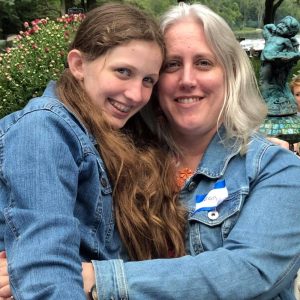The year was 2004. George W. Bush was still president, and heading for re-election. 24 was popular on television. In January of that year, on the date that OutKast’s “Hey Ya” topped the charts, I gave birth to my second child. It was so long ago that we had to take pictures of her with a film camera and get them developed instead of immediately uploading them. Facebook wasn’t even invented yet.
It was also the year I learned I have celiac disease.

As that year wore on, I was tired. Exhausted, really. In a fog.
To the extent that reading a Clifford book felt like a chore. Are you familiar with the Clifford stories? There’s about one sentence per page. I longed for bedtime.

But of course I was tired. I had two kids under the age of 4. I was working full time.
My husband was staying home during the day and working in the evenings. Who wouldn’t be tired under those circumstances?
I also started having, to put this delicately, bathroom problems. Of the kind that required me to be near a restroom often.
But, I was a mom. A working mom. I was busy. It was probably fine. Who has time to go to the doctor?
In June of 2004, the four of us took a trip to Minnesota to celebrate my grandmother’s 90th birthday. On the way home from that trip, I started to feel really, just—not right.
I’m the kind of person who rarely gets sick.
I’m not saying that to brag, nor am I claiming that it’s due to any sort of healthy regimen. It just is. But I became very lethargic, and lost my appetite. And decided to finally see a doctor.
First, I went to a primary care physician, whom I told I’d been having diarrhea for two months. She thought I said two weeks, and was alarmed by that. She was more alarmed when I repeated that it was two months.
Some blood samples were taken. She told me she was worried about my elevated liver enzymes. As one does, I looked that up on the internet, and couldn’t make any sense out of what “elevated liver enzymes” means. She referred me to a gastroenterologist.
The gastroenterologist did another blood sample, and told me matter-of-factly, “I’m not impressed with your liver enzymes,” which I thought was an interesting way of saying that my liver enzymes weren’t elevated enough to cause any concern. He ordered a colonoscopy.
I think I did that colonoscopy on my birthday which, in retrospect, is kind of weird.
Anyway, what the colonoscopy showed was signs of celiac disease.
Here’s how celiac disease works, in layman’s terms, because I’m no doctor. Your body sees gluten (which is the protein gliadin, found in wheat, barley, and rye) as an invasive force, and works against it. It flattens the villi in your small intestines. The villi are the little fingers that reach out and grab nutrition from your food. Essentially, you become malnourished—which can show as different symptoms for different people. But included among them are “diarrhea” and “brain fog.”
Gluten free wasn’t really a trend in 2004, and it wasn’t easy to find food.
I know that many celiac people will tell you that it isn’t that hard, just eat fruits and vegetables, and do you really need to eat cookies, but my answer is: yes. Yes, I do need to eat cookies.
I’m pleased that gluten free options are much more readily available these days. There’s even E’s Gluten Free Bakery right here in Iowa City. Restaurants often have gluten free menus. This is a vast improvement over my early diagnosis days, when I stood bewildered in the middle of HyVee, wondering, “What am I supposed to even EAT”?
I found good resources at celiac.com.
I also learned that Elisabeth Hasselbeck learned of her celiac because subsisting on a diet of rice while on Survivor cleared up her symptoms.
Celiac disease can be triggered by “traumatic” events to the body, and pregnancy is certainly a stressor.
I wouldn’t give up the kid to be tolerant of gluten, though. She’s worth the sacrifice.

You can learn more about celiac disease by visiting the Mayo Clinic’s website.










